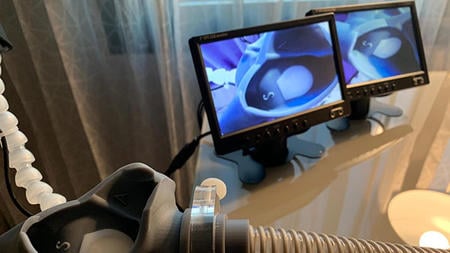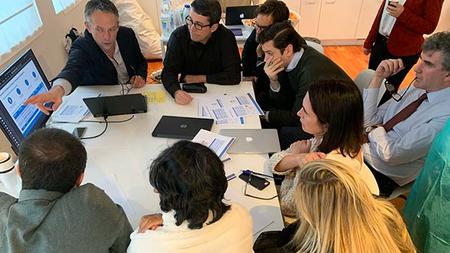Curious to see the programme?
Discover the typical agenda and scientific content for the Advanced Transseptal Puncture Course, consisting of a pre-course dinner and two days of hands-on training, perfect for practising your skills.
The programme comprises pre-course online learning, then onsite training based on clinical case reviews, step-by-step best practices and troubleshooting sessions, as well as training on high fidelity physical and computer simulators under the guidance of expert trainers.
Following the successful completion of a structured test, participants obtain the certification that they have the knowledge and skills required to safely and effectively perform transseptal puncture. Read on to find out more!
Topics covered
- Large bore venous access and closure
- Transseptal puncture material, techniques and management
- Left heart navigation
- Imaging for mitral interventions
Simulators used for training
- 3 Venous access and closure simulators
- 5 Physical dry transseptal puncture simulators
- 3 Digital echo-guided transseptal puncture heart simulators
Learning objectives:

Upgrade your TSP mandatory knowledge (material, Indications, standard operating procedure, complication management...)

Upgrade your TSP skills by sharing best practices with your peers, and benefit from “best in class” pre-clinical training (before you enter clinical practice)

Get validation and certification of your competence and skills (for active interventionalists who already perform procedures)

Summary of the cursus
- Anatomy of the right heart and venous system and its relationship to the left side of the heart
- Imaging for transseptal puncture and left heart navigation
- Anticoagulation management for left heart interventions
- Material for transseptal puncture
- Standard operating procedures and material for access and closure
- Standard operating procedures for echo-guided transseptal puncture
- Disease specific transseptal punctures
- Challenging transseptal situation and complication prevention
- Troubleshooting and complication management
- Access and closure of venous access
- Transseptal puncture for different therapies
- Left heart navigation
Advanced Course on Transseptal Puncture is accredited by EBAC for 12 hours of external CME credits

This activity has been accredited by the European Board for Accreditation of Continuing Education for Health Professionals (EBAC®).
Through an agreement between the European Board for Accreditation of Continuing Education for Health Professionals and the American Medical Association physicians may convert EBAC® CE credits to AMA PRA Category 1 Credits™. Information on the process to convert EBAC credit to AMA credit can be found on the AMA website. Other health care professionals may obtain from the AMA a certificate of having participated in an activity eligible for conversion of credit to AMA PRA Category 1 Credit™.Onsite agenda

Day 1 – Tuesday, 9 September
- 07:30 – 08:00 Welcome coffee and badge collection
- 08:00 – 08:15 Pre-test
- 08:15 – 08:30 Introductions (participants & facilitators)
- 08:30 – 08:45 Transeptal puncture – The summary
- 08:45 – 09:45 WetLab: Heart dissection, needle demonstration, NRG activity
- 09:45 – 10:15 Indications & contraindications for TS puncture, medical work-up
- 10:15 – 10:30 Coffee break
- 11:00 – 12:00 Venous access & closure, materials for TS puncture & LA navigation
- 12:00 – 13:00 Lunch
- 13:00 – 13:30 Simulation-based learning: types & use of simulators
- 13:30 – 15:30 Hands-on practice (rotating stations):
- Station A: Virtual simulator – TS puncture (Mentice)
- Station B: Realistic simulator – TS puncture (Simulatics)
- Station C: LA navigation (Proglide, Agilis, ICE simulator, etc.)
- 15:30 – 16:00 Coffee break
- 16:00 – 17:00 Hands-on practice (continuation)

Day 2 – Wednesday, 10 September
- 08:00 – 09:00 Step-by-step guided TS puncture (fluoroscopy, TEE, ICE), disease-specific approaches
- 09:00 – 09:40 Haemodynamic Lab: TS puncture, Proglide visualisation
- 09:40 – 10:30 Case examples of TS-related procedures (Mitraclip, Pascal, Cardioband, LAAO, etc.)
- 10:30 – 11:00 Coffee break
- 11:00 – 11:30 Complex anatomies & challenging situations
- 11:30 – 12:30 Complications management & troubleshooting
- 12:30 – 13:00 Lunch
- 13:00 – 13:30 Certification test
- 13:30 – 15:30 Simulation test (Stations A & B)
- 15:30 – 16:00 Coffee break
- 16:00 – 17:00 Simulation test (continuation)
- 17:00 – 17:30 Certification ceremony & course closure


